
Juche, officially the Juche idea, is the state ideology of North Korea and the official ideology of the Workers' Party of Korea. North Korean sources attribute its conceptualization to Kim Il Sung, the country's founder and first leader. Juche was originally regarded as a variant of Marxism–Leninism until Kim Jong Il, Kim Il Sung's son and successor, declared it a distinct ideology in the 1970s. Kim Jong Il further developed Juche in the 1980s and 1990s by making ideological breaks from Marxism–Leninism and increasing the importance of his father's ideas.
Korean nationalism can be viewed in two different contexts. One encompasses various movements throughout history to maintain a Korean cultural identity, history, and ethnicity. This ethnic nationalism was mainly forged in opposition to foreign incursion and rule. The second context encompasses how Korean nationalism changed after the partition in 1945. Today, the former tends to predominate.

Reading is a popular pastime in North Korea, where literacy and books enjoy a high cultural standing, elevated by the regime's efforts to disseminate propaganda as texts. Because of this, writers are held in high prestige.
Baik Bong (Korean: 백봉) is a North Korean author known for writing the official biography of Kim Il Sung.
The Communist movement in Korea emerged as a political movement in the early 20th century. Although the movement had a minor role in pre-war politics, the division between the communist North Korea and the anti-communist South Korea came to dominate Korean political life in the post-World War II era. North Korea, officially the Democratic People's Republic of Korea, continues to be a Jucheist state under the rule of the Workers' Party of Korea. In South Korea, the National Security Law has been used to criminalize advocacy of communism and groups suspected of alignment with North Korea. Due to the end of economic aid from the Soviet Union after its dissolution in 1991, due to the impractical ideological application of Stalinist policies in North Korea over years of economic slowdown in the 1980s and receding during the 1990s, North Korea continues to nominally uphold Communism, but has replaced Marxism-Leninism with the Juche idea. References to Communism were removed in the North Korean 1992 and 1998 constitutional revisions to make way for the personality cult of Kim's family dictatorship and the North Korean market economy reform. The Workers' Party of Korea under the leadership of Kim Jong Un later reconfirmed commitment to the establishment of a communist society, but orthodox Marxism has since been largely tabled in favor of "Socialism in our style". Officially, the DPRK still retains a command economy with complete state control of industry and agriculture. North Korea maintains collectivized farms and state-funded education and healthcare.

The Workers' Party of Korea (WPK) is the sole ruling party of the Democratic People's Republic of Korea, commonly known as North Korea. Founded in 1949 from the merger of the Workers' Party of North Korea and the Workers' Party of South Korea, the WPK is the oldest active party in Korea. It also controls the Korean People's Army, North Korea's armed forces. The WPK is the largest party represented in the Supreme People's Assembly and coexists with two other legal parties making up the Democratic Front for the Reunification of Korea. However, these minor parties are completely subservient to the WPK and must accept the WPK's "leading role" as a condition of their existence. The WPK is banned in the Republic of Korea under the National Security Act and is sanctioned by the United Nations, the European Union, Australia, and the United States.

Propaganda is widely used and produced by the government of North Korea (DPRK). Most propaganda is based on the Juche ideology and on the promotion of the Workers' Party of Korea.

The Cleanest Race: How North Koreans See Themselves and Why it Matters is a 2010 book by Brian Reynolds Myers. Based on a study of the propaganda produced in North Korea for internal consumption, Myers argues that the guiding ideology of North Korea is a race-based far-right nationalism derived from Japanese fascism, rather than any form of communism. The book is based on author's study of the material in the Information Center on North Korea.
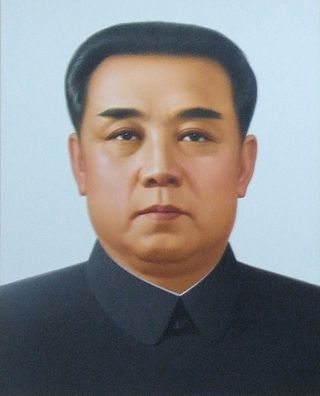
Kim Il Sung was the leader of North Korea for 46 years, from its establishment in 1948 until his death in 1994.
Events from the year 1955 in North Korea.

On the Art of the Cinema is a 1973 treatise by the North Korean leader Kim Jong Il. It is considered the most authoritative work on North Korean filmmaking.
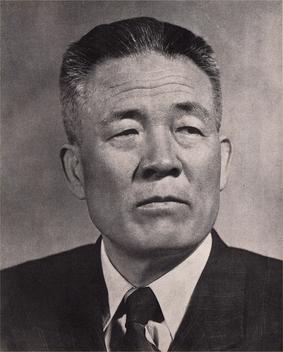
Han Sorya was a Korean writer, literary administrator and politician who spent much of his career in North Korea. Regarded as one of the most important fiction writers in North Korean history, Han also served as head of the Korean Writers' Union and Ministry of Education.

Cho Ki-chon was a Russian-born North Korean poet. He is regarded as a national poet and "founding father of North Korean poetry" whose distinct Soviet-influenced style of lyrical epic poetry in the socialist realist genre became an important feature of North Korean literature. He was nicknamed "Korea's Mayakovsky" after the writer whose works had had an influence on him and which implied his breaking from the literature of the old society and his commitment to communist values. Since a remark made by Kim Jong Il on his 2001 visit to Russia, North Korean media has referred to Cho as the "Pushkin of Korea".
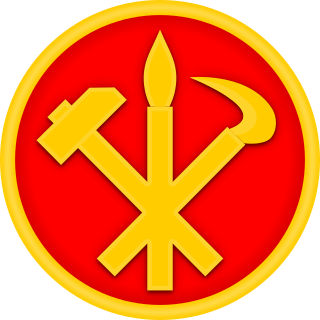
The Propaganda and Agitation Department, officially translated as the Publicity and Information Department, is a department of the Central Committee of the Workers' Party of Korea (WPK) tasked with coordinating the creation and dissemination of propaganda in North Korea. It is the highest propaganda organization in the country.
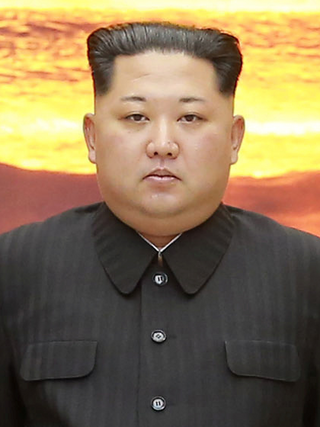
Kim Jong Un has been the supreme leader of North Korea since the death of Kim Jong Il in 2011.
Kim To-man (김도만) was a faction member of the Kapsan Faction, and the Director of the Propaganda and Agitation Department (PAD) of North Korea, but removed from office by Kim Il Sung.
This is a list of works important to the study of North Korea.
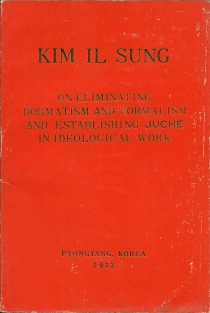
On Eliminating Dogmatism and Formalism and Establishing Juche in Ideological Work, also known as the "Juche speech", was a speech delivered on 28 December 1955 by Kim Il Sung. The address mentioned his Juche ideology by name for the first time. It is considered one of Kim's most important works and a "watershed moment" in North Korean history. Views differ if the speech used the term juche to launch an ideology or more conservatively to assert that the Korean people were the subject of the revolution. The former believes that Juche, as a distinct ideology, was developed by Hwang Jang-yop on his re-discovery of the speech. The speech was published for the first time in 1960 and in many subsequent, heavily edited revisions since.
Racism in North Korea is a phenomenon that is relatively poorly understood. The North Korean media and government's usage of Korean ethnic nationalism's race-based concepts such as "pure blood" has been described as racist.

Officially, the Workers' Party of Korea (WPK) – the ruling party of North Korea – is a communist party guided by Kimilsungism–Kimjongilism, a synthesis of the ideas of Kim Il Sung and Kim Jong Il. The party is committed to Juche, an ideology attributed to Kim Il Sung which promotes national independence and development through the efforts of the popular masses. Although Juche was originally presented as the Korean interpretation of Marxism–Leninism, the party now presents it as a freestanding philosophy. The WPK recognizes the ruling Kim family as the ultimate source of its political thought. The fourth party conference, held in 2012, amended the party rules to state that Kimilsungism–Kimjongilism was "the only guiding idea of the party". Under Kim Jong Il, who governed as chairman of the National Defence Commission, communism was steadily removed from party and state documents in favour of Songun, or military-first politics. The military, rather than the working class, was established as the base of political power. However, his successor Kim Jong Un reversed this position in 2021, replacing Songun with "people-first politics" as the party's political method and reasserting the party's commitment to communism.











